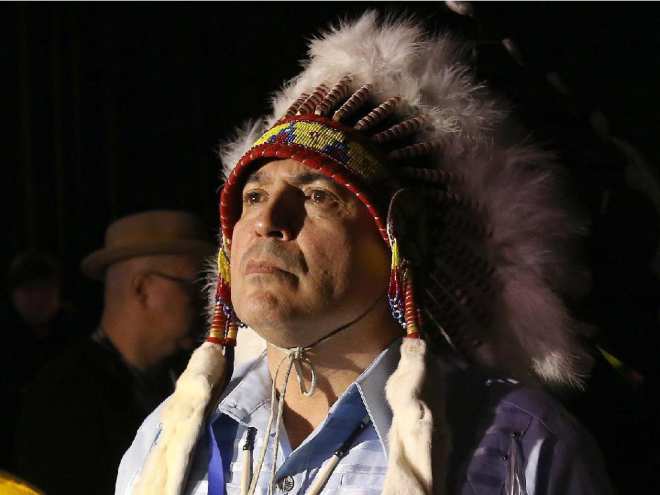Canadians Must Heed Advice of Residential Schools Commission: Perry Bellegarde
By Mark Kennedy
Canada’s indigenous people and non-aboriginals have a “shared responsibility” to fix their broken relationship for the sake of future generations, says the head of the country’s largest aboriginal organization. In an interview Friday with the Citizen, Assembly of First Nations (AFN) national chief Perry Bellegarde called on people from all walks of life to heed the recommendations next week of the Truth and Reconciliation Commission (TRC). That commission spent six years examining the residential school system, in which the federal government sent aboriginal children to church-run schools, where many faced physical, emotional and sexual abuse. The commission is expected to propose far-reaching changes to restore trust between the country and its First Nations, and to help improve the lives of aboriginals in areas such as health, education and justice. “If the recommendations and the call to action are not acted on and implemented, then it’s really all for nothing,” said Bellegarde. “How do we go about reconciliation if there’s not actual take-up – not only from governments, but from Canadians? “We’ve got a shared history in this country between indigenous and non-indigenous people. And we also have a shared responsibility to make sure that reconciliation actually happens.” Meanwhile, there are signs from the chair of the TRC, Justice Murray Sinclair, that the commission will conclude the residential schools were just part of a broader plan to assimilate indigenous people for decades. In a recent interview with the Citizen, Sinclair indicated the commission will call on all Canadians — not just politicians — to join together to fix a seriously damaged “relationship” between aboriginals and non-aboriginals. “Reconciliation is really a process. It’s about a relationship. If you think about it in terms of a marriage, that’s about establishing a relationship, and establishing rules about how you deal with issues that come up during that relationship.” “Right now, the relationship is not a good relationship. It’s not a mutually respectful relationship.” Indeed, Sinclair said there needs to be a process to resolve problems — such as the current disagreement over how to improve First Nations education and whether there should be an inquiry into missing and murdered aboriginal women. “People need to be able to deal with that in a way that has meaning to both sides. We don’t have to agree in order to reconcile. We have to be respectful of each other in order to reconcile. That’s the key.” “We have to have marriage counselling from time to time in this relationship,” said Sinclair. “So we need to be prepared to bring in somebody who is going to resolve this. If we have a situation where one party always thinks that they are in charge of the other party — which is now the kind of relationship that is going on — that’s not going to work.” The residential schools saga is one of Canada’s biggest untold stories. Since the 1880s, more than 150,000 aboriginal children were torn from their families and sent to about 130 residential schools. The residential school survivors sued the federal government and churches — leading to a 2007 court settlement that issued compensation payments for former students, and established the TRC. The commission heard from more than 7,000 witnesses and went to court to force the federal government to release archival documents. Next Tuesday, the commissioners will release an executive summary of their findings, with recommendations. Sinclair said the residential schools (the last one closed in 1996) were just part of an overall effort to teach aboriginals they were an “inferior” people and that non-aboriginals came from a “superior civilization.” “So this process of colonization and social oppression that Canada has gone through now since Confederation has come to a halt, thankfully,” said Sinclair. “But now we need to deal with the legacies of it, the outcomes of it, the impacts of it.” “We need to ask ourselves: What can we do to ensure that not only it doesn’t happen again but that we fix what we have damaged?” Bellegarde warned that if governments and Canadians ignore the TRC, “negative stereotypes” about First Nation people will persist. “We’re going to have a missed opportunity to really make Canada the country that it can be – which is embracing diversity, which is free of racism and discrimination, which really embraces the contributions that indigenous peoples have made to Canada and to society.” Bellegarde said First Nations themselves have a responsibility to act – by reaching out to work with non-aboriginals, and by working to restore languages and culture for young indigenous people. He said if people become frustrated they should not resort to violence. “Violence is not our way. Peaceful co-existence and mutual respect is what our elders always teach us.”
|
.
Any original material on these pages is copyright © BishopAccountability.org 2004. Reproduce freely with attribution.
